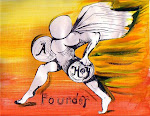I've had one or two complimentary things said about a few of the comments that I posted on the Pharmalot thread about the Bob Fiddaman intimidation thing. I, and one or two other people were a little disappointed that the discussion was often diverted towards the usual dichotomous "Pharma's excellent/No it's not, it's shit" argument. Being a lawyer, albeit an academic one, I saw the argument as being largely legal in its nature.
There appears to be an almost identical precedent to hand, in order that we might instruct ourselves as to any outcome, should GSK be stupid enough to pursue this to court. Yup, it's McLibel. So, I've decided to quickly run through what happened in McLibel, and then people can draw the parallels for themselves. If you want to check the accuracy of Bob's claims, then the information's on the internet. If you want to clarify the inconsistencies with the "powers" that be, which Bob has highlighted, then I suspect that you can go whistle, which is what we've been told to do, pretty consistently.
McLibel Revisited
By way of preamble, McLibel centres on a confrontation between two activists, Dave Steel and Helen Morris, over the circulation of a pamphlet, entitled "What's Wrong with McDonalds?" and McDonalds itself. A series of allegations was made in the pamphlet, which you can read for yourself, here. In brief, they concerned deforestation of the Amazon for beef farming, treatment of employees, the nutritional value of the product, exploitation of children through targeted marketing, and so on, and so on.
Ronald, it seems, didn't take kindly to this, and brought a libel action against the five London Greenpeace (not to be confused with Greenpeace), activists who had produced and distributed the pamphlet, as I understand it. The five were targeted, because London Greenpeace had no corporate identity to pursue (ie, it was just a name that a bunch of people had chosen for their loose-knit organization). Most backed down, but Steel and Morris decided to tough it out. The trial turned into the longest in English legal history, but provided massively valuable legal precedent, which Bob Fiddaman, myself and others are only too happy to exploit. Helen Steel and Dave Morris, we salute you!
I won't go into the minutiae of the discussion. Libel trials, being what they are, centre on questions of fact (ie, the only complete defence in libel is that what one has said is true, and it is incumbent upon defendants to demonstrate the truth of their assertions). Because of the hugely technical nature of demonstrating, say, that McDonalds was responsible to a certain extent for the deforestation of the Amazon, this was obviously a lengthy debate.
Now, because of the technical nature of the debate, it was accepted by the Court that McDonalds was correct to argue that ordinary people would not be able to comprehend the scientific nature of the discussion, and thus the trial was heard by His Honour, Mr Justice Bell, alone (ie, unlike your average libel trial, there was to be no jury). Also, as a matter of public policy, no Legal Aid is available for libel cases, and so the defendants had to fund their defence from their own resources and from donations from the public. Pay attention, here, because this becomes relevant about two years' later!
At the end of the High Court trial, the judge ruled that McDonalds did 'exploit children' with their advertising, produce 'misleading' advertising, are 'culpably responsible' for cruelty to animals, are 'antipathetic' to unionisation and pay their workers low wages. However, because the defendants had failed to demonstrate the truth of all their allegations the Judge ruled that they HAD libelled McDonald's and should pay GBP60k in damages. They refused and McDonald's chose not to pursue it.
The defendants appealed against the High Court decision and in March, 1999 the Court of Appeal made further rulings that it was fair comment to say that McDonald's employees worldwide "do badly in terms of pay and conditions", and true that "if one eats enough McDonald's food, one's diet may well become high in fat etc., with the very real risk of heart disease.
Steel and Morris were on a roll! They took their case to the European Court of Justice in Strasbourg, arguing that their right to a fair trial and their right to freedom of speech had been transgressed by the UK legal system. And they won, again. In brief, the public interest privilege that had been the sole perquisite of the press was extended to the public, generally. That is, provided one is not malicious, one may comment freely on a matter pertaining to the public interest. And seeing as the public interest appears to amount to "what interests the public," one may say what one chooses. The absence of Legal Aid was also criticized - there was no equality of position between plaintiff and defendant. Read the judgment, here, if you want the detail.
None of this means that one can recklessly and wantonly make impressionistic claims that impact upon the reputation of others, of course. Even if a person has contradicted themselves in public, or whose actions or pronouncements are full of inconsistencies, it is better to say that they are full of inconsistencies, rather than say outright that they are liars and hypocrites. If one wishes to say that they are liars and hypocrites, one should make it clear that it is one's opinion, based upon the facts available, because we are still permitted to hold opinions, in this country, if only just.
However, where one relies upon sources that ought to be reliable, and draws inferences based upon the information available there, then one is within the libel laws of England and Wales. And that, my friends, is really all there is to it.
Matt
Wednesday, 9 April 2008
Subscribe to:
Post Comments (Atom)

.jpg)






2 comments:
I can only write that that made me chuckle - I hadn't thought of that!
Matt
Post a Comment